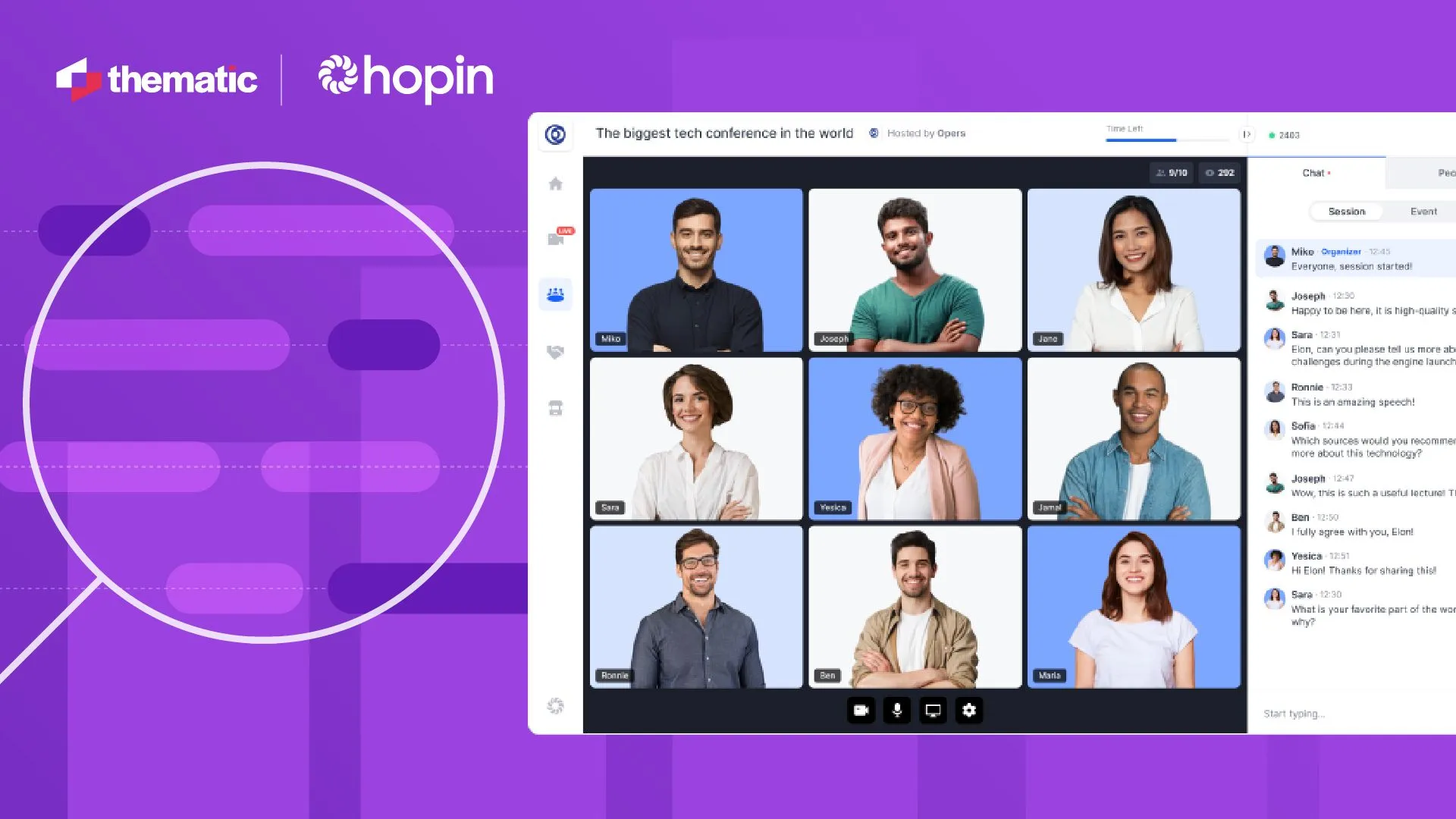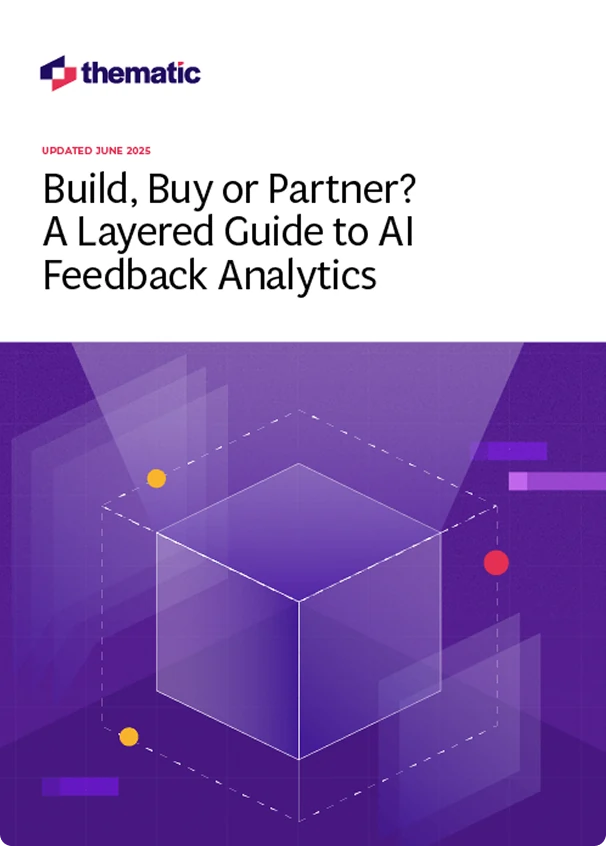From Ignored to Indispensable: The Proven, Step-by-Step CX Insights Mastery Blueprint in < 6 Days! Get free access>

Discover how Hopin empowered product teams with data-driven prioritization by using Thematic to transform customer feedback into rich insights at scale. Learn how Thematic simplified the process and helped product teams build critical features faster.

When I first joined Hopin, the company was still in its early stages—just 70 of us, all working together to create virtual event experiences that felt more connected. Little did I know just how quickly things would change.
Fast forward a few years, and Hopin grew to over 1,000 employees. This kind of hypergrowth, while exciting, brings its own set of challenges, and one of the biggest was getting customer insights from feedback.
As the pandemic accelerated our growth, we suddenly had a flood of feedback coming in from our rapidly expanding customer base. At first, it felt manageable. We used Notion to track feature requests, and for a small team, it worked well. It was transparent and gave us a clear line of sight into what our customers needed. But as we grew, so did the complexity of analyzing all that feedback. We quickly realized that our old systems wouldn’t scale with us, and that’s where our journey into more sophisticated feedback analysis began.
As the team got bigger, so did the feedback. We quickly realized Notion wasn’t going to cut it anymore. So, we switched to Productboard, which felt like an upgrade. It helped us collect feedback from different channels and gave us a clearer view of what our customers were asking for.
But even with Productboard, we were still struggling. Our product managers were buried under hundreds of feedback entries every week. I tried to help by pulling everything together into deep-dive reports, but it still felt like we were drowning in data. We started to lose sight of the bigger picture.
Don't lose sight of the bigger picture when you analyze customer feedback
On top of that, certain voices were getting louder than others, which meant we weren’t always prioritizing the right things. It was becoming clear that we needed something better to make sense of it all.
That’s when we found Thematic. Honestly, I didn’t realize how badly we needed it until we started using it. We had so much feedback—some focused on problems, others offering solutions—but it was hard to see the patterns. Thematic changed that for us. It didn’t just tell us what customers were saying; it helped us understand why they were saying it.
Thematic AI helped us understand what customers were saying
One of the first things my colleague David and I did with Thematic was build a “Voice of the Customer” report. We could finally take all the feedback, organize it into themes, and tie those insights back to important metrics like how many customers were impacted or how much revenue was on the line. That was huge for us. It gave us clear data to prioritize features and align the whole team around what mattered most.
One of the biggest surprises Thematic revealed was something we hadn’t even considered a top priority—the “event announcement” feature. It had come up a few times in Productboard, but it was never flagged as critical. When we looked at the data through Thematic, though, we realized this issue was way bigger than we thought.
The problem wasn’t just about making announcements—it was about managing attendee flow during live events, something that was seriously affecting the user experience. What was interesting is that some of our quieter customers—those who didn’t often speak up—were the ones most affected. Relying on customer success managers (CSMs) alone to gather feedback had led to some blind spots, but with Thematic, those hidden trends surfaced.
Because of that insight, we bumped up the priority of the event announcement feature, and once we rolled it out, the feedback was overwhelmingly positive. Customers were thrilled, and it solved a real pain point we might’ve missed without Thematic.
Thematic revealed that Hopin needed an announcement feature to manage attendees
If there’s one thing I’ve learned through all of this, it’s that you can’t do it all manually—not when you’re growing this fast. You need tools that help you get to the insights quickly. Thematic did exactly that for us. It gave us the freedom to focus on deeper, more meaningful customer research, like interviews, rather than getting stuck in the weeds of endless feedback.
But the other big lesson? Pay attention to what you aren’t hearing. It’s easy for the loudest voices to dominate the conversation, especially in a fast-paced environment. Without something like Thematic to surface those quieter but important trends, we might’ve missed crucial insights—like the need for the event announcement feature.
At the end of the day, managing feedback at scale is about finding the right balance between quantitative data and qualitative insights. You have to stay agile and be ready to pivot when the data shows something you didn’t expect. For us, Thematic was the key to staying on top of that, and I honestly can’t imagine trying to get customer insights for our product leaders without it.
Managing feedback at scale is about more than just keeping up with the volume—it’s about making sure you’re getting the most value out of that feedback. It’s not enough to simply manage the flow; you need tools that help you truly understand and prioritize it. That’s where the real power of Thematic came in for us. It didn’t just organize our feedback; it quantified the themes in the qualitative data, helping us identify priorities while also understanding why those issues mattered to our customers.
Blending the quantitative with the qualitative meant we could move beyond surface-level feedback to deeper insights that guided our product decisions. As your feedback scope matures, so should your tools. You need systems that evolve with your business, providing clear direction on where to focus next. Thematic helped us do exactly that, giving us the clarity and confidence to prioritize what really mattered—and to stay agile as we grew.
Join the newsletter to receive the latest updates in your inbox.

Transforming customer feedback with AI holds immense potential, but many organizations stumble into unexpected challenges.